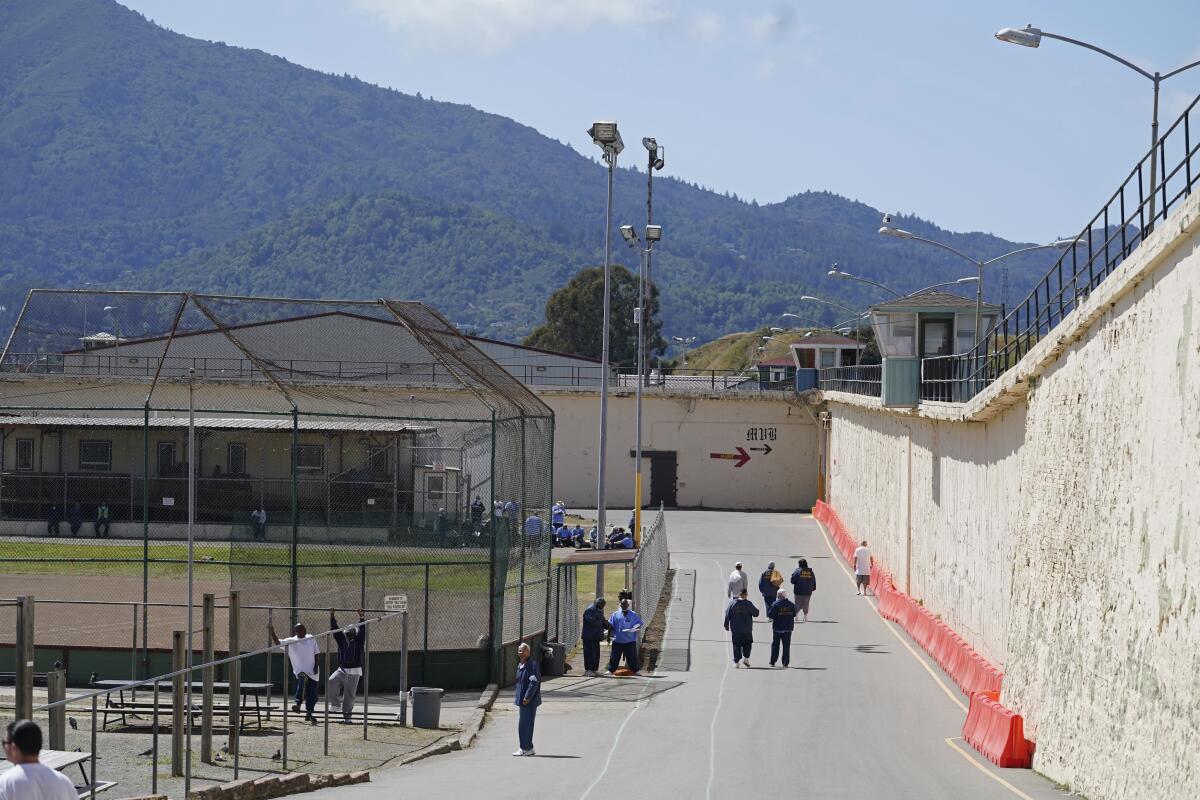Mexican Mafia member sentenced to 11 years for role in cartel alliance

Michael Moreno, a reputed member of the Mexican Mafia, has been jailed for more than nine years on a charge that he helped orchestrate a novel but ultimately thwarted alliance with a Mexican drug cartel that wanted to trade money and drugs for protection in prison and muscle on the streets.
After pleading guilty this year, Moreno, 65, stood before U.S. District Judge Christina A. Snyder on Wednesday dressed in a white jumpsuit, hands shackled to the waist, his salt and pepper hair cropped short.
The judge asked if he wanted to say anything before he was sentenced.
“No, I’m OK,” he said. “I’m OK.”
Snyder sentenced Moreno to 11 years in prison. Because of the time he has spent in custody and credit he’s entitled to for completing a substance abuse program and not being disciplined while behind bars, Moreno is expected to be released soon, said his lawyer, Robert Bernstein.
Among the conditions of a four-year probation, Snyder forbade Moreno from associating with members of the Mexican Mafia “or others known to be participants in the Mexican Mafia’s criminal activities, with the exception of family members.”
No other family has contributed more members to the Mexican Mafia, the prison-based syndicate that controls Latino gang members in prison and on the streets of Southern California, than the Morenos.
“I got a family, big family,” Moreno’s younger brother, Tommy, testified at a recent trial. “I’ve got nine brothers and six sisters. Out of my nine brothers, five of them are Mexican Mafia members.”
There is Michael, better known as “Mike Boo”; Jesse, nicknamed “Pelon,” serving a life sentence for racketeering and said by his lawyers at 83 to be seriously ill; Eddie, who died of an overdose behind bars; Pete, doing life in Arizona for shooting to death a man outside a Phoenix bar; and Tommy, known as “T-Bug,” who has been in prison since 1983 for bank robbery and attacking another inmate at the Lompoc penitentiary.
The federal case against Michael Moreno began in 2011, when Jose “Fox” Landa-Rodriguez, a Mexican Mafia member then held at a federal prison in Virginia, turned to him for help realizing a dream of a drug-trafficking alliance.
Two brothers who sold drugs in the San Fernando Valley, Hugo and Freddie Montes, had reached out to Landa-Rodriguez with a proposal, a task force officer for the Bureau of Alcohol, Tobacco, Firearms and Explosives wrote in a wiretap application.
La Familia Michoacán, a now-defunct Mexican cartel that mostly trafficked in methamphetamine, was willing to put up cash and drugs at below-market prices if, in exchange, the Mexican Mafia agreed to protect the cartel’s members in U.S. prisons and collect drug debts on the streets, the officer wrote.
Landa-Rodriguez called Moreno, who was then on parole in Fresno. “This will open the doors for all of us because the future is big,” Landa-Rodriguez said, according to an affidavit written by an agent for the federal Bureau of Prisons.
A native of Michoacán who faced deportation after finishing his prison term, Landa-Rodriguez told Moreno the traffickers wanted him to one day take charge of “the whole family,” referring to the cartel, the agent wrote.
As a step toward cementing the deal, Freddie Montes, who had ties to La Familia Michoacán, delivered cash from the cartel to a Mexican Mafia member, Ralph “Perico” Rocha, who in turn gave some of it to Moreno, according to testimony at Landa-Rodriguez’s trial. The cartel figures and Mexican Mafia members pursuing the alliance intended to share the money with imprisoned Mexican Mafia members to build support for it, witnesses testified.
Rocha, however, was secretly an informant for the ATF. He was wearing a wire when he told Moreno that the traffickers wanted their help pushing out dealers who weren’t selling their drugs: “They want to be known at the calles” — streets — “that, you know, if you ain’t got Familia drogas, any type of paraphernalia they got going, then you, you are not allowed to do anything and we can let the homies know... We don’t give a f— who it is. Black, white, green, Chinese, everybody. Shut it down.”
They would be La Familia Michoacán’s “security detail,” Rocha said. “Let them do all the drug dealing, let them do all that. And all we do is get the feria” — money — “for the protection.”
A grand jury in 2013 indicted six Mexican Mafia members — including Moreno and Landa-Rodriguez — and seven other defendants on charges of conspiring with the cartel to sell drugs in the United States.
In his guilty plea in July, Moreno admitted to funneling the money Rocha delivered to incarcerated Mexican Mafia members to build support for the deal.
Landa-Rodriguez and several other defendants went to trial in 2019 and were acquitted. Landa-Rodriguez remains jailed on unrelated charges of distributing drugs, committing extortion and ordering murders within the Los Angeles County jail system. He has pleaded not guilty and is awaiting trial.
A year after he was indicted in federal court, Moreno was charged by Ventura County authorities who had been leading their own investigation into his grip over local gangs and drug rackets.
Detectives in Ventura County caught onto Moreno in 2013 when an associate of the Mexican Mafia, Alejandro “Danger” Ornelas, was discharged from Pelican Bay State Prison after finishing a 13-year term for robbery.
A member of Oxnard’s Colonia Chiques gang since he was 13, Ornelas returned to his old neighborhood with instructions from the underworld heavyweights he’d been imprisoned with, Det. Victor Medina of the Ventura County Sheriff’s Department wrote in a wiretap application.
The county was in the midst of a power struggle, with Moreno on one side and another Mexican Mafia member, Martin “Evil” Madrigal, on the other, Medina wrote.
Madrigal seemed to be on the losing end, according to the detective’s affidavit: His lieutenants had been arrested, and other Mexican Mafia members were sending word from state prison that no one was to pay “taxes” to him.
Latino gangs must make regular payments to Mexican Mafia members, who have divided Southern California and other areas of the state into personal fiefdoms. While most gangs come up with the tax by collecting money from drug dealers who sell in their territory, they will also rob people, burglarize homes and extort businesses to meet their obligations, Medina wrote.
A month after he left Pelican Bay, Ornelas called a meeting of Ventura County gang members at a Mexican seafood restaurant in Calabasas, according to Medina’s affidavit. One of the attendees was wearing a wire.
Ornelas declared he was working for “Boo Boo” and “the Viejo” — Moreno and another Mexican Mafia member, James “Rube” Soto, detectives concluded. Whatever taxes Madrigal had been paid in the past would now go to them, Ornelas told the group. If there was any resistance, he warned that he “had a crew from Los Angeles lined up already, and they were killers,” Medina wrote.
Authorities obtained a wiretap on Moreno’s phone. They listened as inmates on prison yards throughout the state sought Moreno’s blessing to work under his authority and offered to send him money for the privilege, Medina wrote.
Moreno was overheard telling an underling “the guys in Oklahoma” — an apparent reference to the contracted, out-of-state facilities where corrections officials once sent inmates to relieve an overburdened prison system — could send the money to a computer company he’d registered at a post office box, Medina wrote.
To another subordinate, Moreno boasted he’d bought a new house on the better side of Fresno with two stories, five bedrooms, two-and-a-half bathrooms and an underground bomb shelter, according to Medina’s affidavit.
Moreno has pleaded guilty to two counts of conspiracy with a gang enhancement in the Ventura case, court records show. Prosecutors have agreed to a time-served sentence that will not add time to his federal term, his lawyer said.
“He’s looking forward to being home with his grandchildren and family,” Bernstein told the judge.
More to Read
Sign up for Essential California
The most important California stories and recommendations in your inbox every morning.
You may occasionally receive promotional content from the Los Angeles Times.










